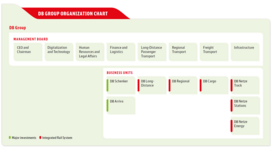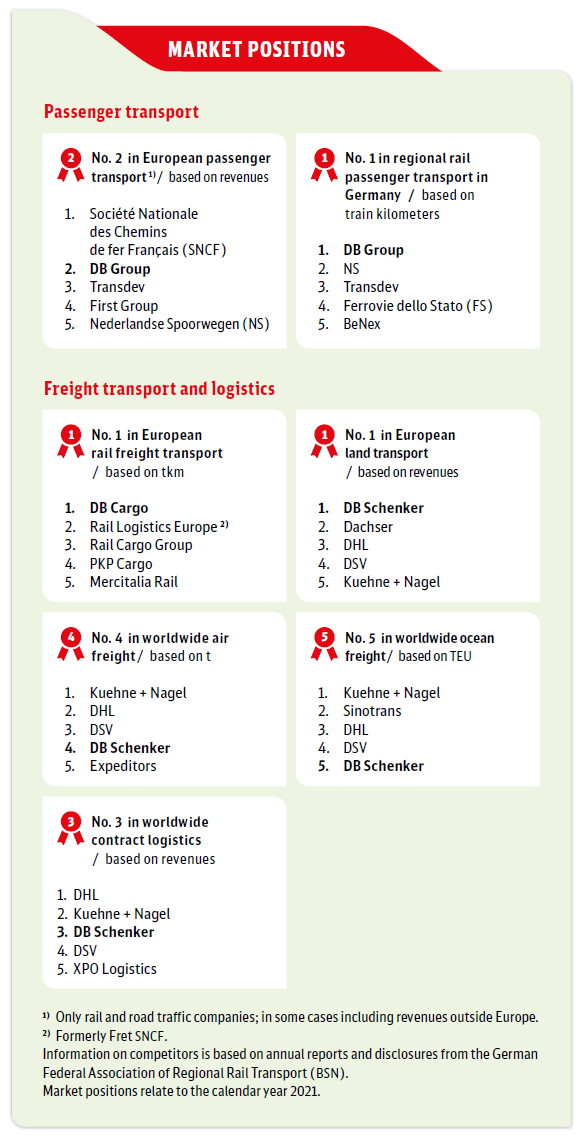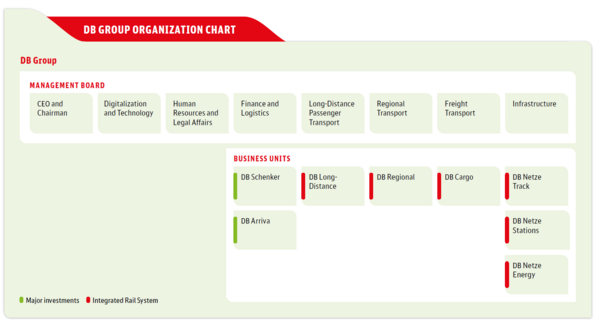DB Group
Organizational structure

DB Group is a leading provider in the mobility and logistics sector, and primarily consists of the Integrated Rail System and the two major international subsidiaries DB Schenker and DB Arriva. The Integrated Rail System includes our passenger transport activities in Germany, our rail freight transport activities, the operating service units, and the rail infrastructure companies. DB Group, with its head office in Berlin, employs around 340,000 employees. Its business operations are focused on rail transport in Germany.
Our primary concern is the shift from road traffic to climate-friendly rail. To this end, we rely on integrated operation of transport and rail infrastructure, the economically and environmentally intelligent linkage of all modes of transport, as well as cooperation in German and European networks. At about 33,000 km, our rail network in Germany is Europe’s longest. We are also one of the largest energy suppliers in Germany.

With its Strong Rail strategy, DB Group focuses on the business operations of the Integrated Rail System. As a prerequisite for the further shift in the mode of transport towards rail, the highest priority is to increase operating quality with a view to increasing capacity. To achieve these objectives, the coalition agreement of the Federal Government stipulates, among other things, that the infrastructure companies DB Netz AG and DB Station&Service AG within DB Group be merged into a new infrastructure division focusing on the common good.
Given the importance of Strong Rail for Europe, Europe will continue to be the main sphere of activity for DB Group in the future. Major international investments are measured by their contribution to Strong Rail.
Business model
DB Group offers attractive, customer-focused and environmentally friendly mobility, transport and logistics solutions and networks from a single source. We utilize the possibilities of digital technologies to improve our operational and administrative processes, to continuously develop services for customers, to integrate new services, and to simplify the customer interface. The Integrated Rail System is at the heart of our business activities. In addition, we are gradually expanding our business portfolio in the area of mobility and logistics in order to meet our customers’ needs more effectively and respond to new market demands.
Sustainability management
The importance of sustainability and, in particular, the importance of climate protection are reflected in our sustainability organization as well as being anchored in the Strong Rail strategy. The Chief Sustainability Officer (CSO) is responsible for the issues of sustainability and the environment – and therefore also for climate-related opportunities and risks. The role is performed by the Chairman of the Management Board (CEO) of DB AG. The central Sustainability and Environment organizational unit and its five specialist departments are responsible for overall coordination of Group-wide sustainability issues. The management of Sustainability and Environment is the highest position responsible for sustainability and climate-related issues under the Management Board and reports directly to the CEO.
Sustainability and the environment are a top priority of the Strong Rail strategy. The Supervisory Board and the Management Board receive quarterly updates on the status of the Environment and 100% green electricity building block for the Green Transformation and thus about sustainability, environmental and climate issues. Progress in greenhouse gas reduction, noise reduction and in future also on resource conservation is reviewed at regular performance review meetings held during the year, which are attended by the Management Board and the executives of the business units.
The structure of the variable compensation of Management Board members and executives as well as other employee groups in DB Group is largely geared towards sustainability goals and in particular a significant reduction of CO₂e in the transport sector in Germany in accordance with the Federal government’s transport policy objectives.
